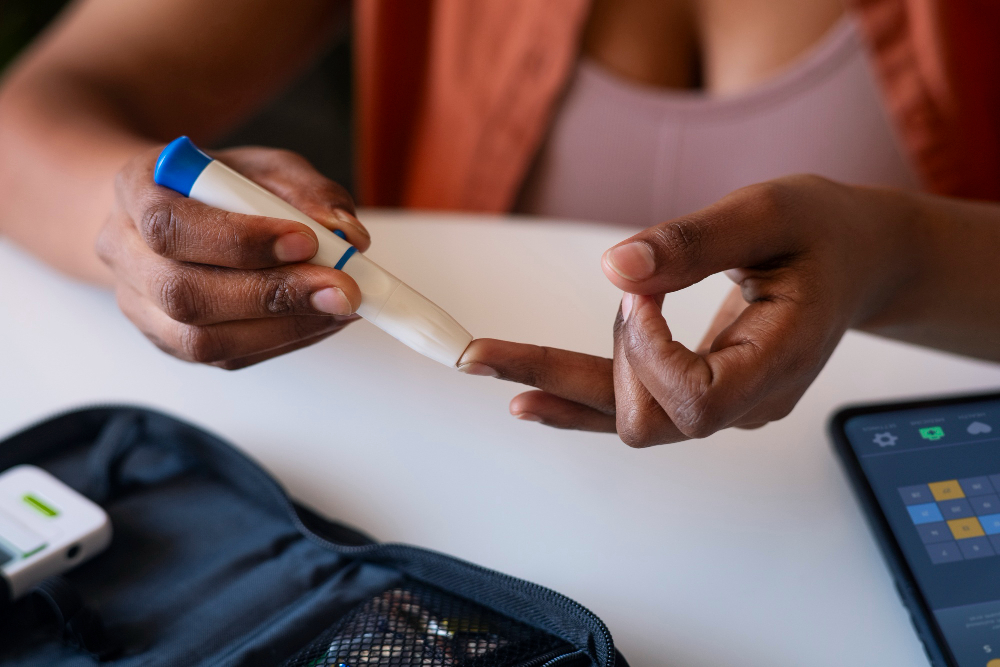Introduction
Diabetes has emerged as a significant public health concern in Ghana, affecting millions of individuals and placing a considerable burden on the healthcare system. The increasing prevalence of diabetes is linked to lifestyle changes, urbanization, and dietary shifts. This blog delves into the challenges faced by diabetes patients in Ghana and explores effective management strategies that can help improve outcomes for those living with this chronic condition.
Understanding Diabetes
Diabetes is a chronic disease characterized by high levels of glucose in the blood. There are two main types of diabetes:
- Type 1 Diabetes: An autoimmune condition where the pancreas produces little to no insulin. It often develops in childhood or adolescence.
- Type 2 Diabetes: The more common form, which usually develops in adults and is often associated with obesity, physical inactivity, and poor diet. It occurs when the body becomes resistant to insulin or fails to produce enough.
Prevalence of Diabetes in Ghana
The World Health Organization (WHO) estimates that about 1.5 million people in Ghana have diabetes, and this number is expected to rise due to urbanization and lifestyle changes. The prevalence of diabetes is especially high in urban areas, where sedentary lifestyles and unhealthy eating habits are more common.
Challenges in Managing Diabetes in Ghana
1. Limited Awareness and Education
One of the most significant challenges in managing diabetes in Ghana is the lack of awareness and education among the population. Many individuals do not recognize the symptoms of diabetes or understand the importance of regular monitoring and treatment. This often leads to late diagnoses and poor management of the disease.
2. Access to Healthcare
Access to quality healthcare services is another major challenge. In rural areas, healthcare facilities may be limited, and patients often have to travel long distances to receive care. Additionally, there is a shortage of healthcare professionals trained in diabetes management, which can lead to inadequate treatment and support.
3. Cost of Medications and Supplies
The cost of diabetes medications, such as insulin, and necessary monitoring supplies can be prohibitive for many individuals. Without affordable access to these essential resources, patients may struggle to manage their condition effectively.
4. Cultural Beliefs and Stigma
Cultural beliefs and stigma surrounding diabetes can also hinder effective management. In some communities, diabetes is viewed as a curse or punishment, leading to discrimination and reluctance to seek medical help.
5. Lifestyle Factors
The rise in obesity and sedentary lifestyles in Ghana is a contributing factor to the increasing prevalence of Type 2 diabetes. Traditional diets are often replaced with processed foods high in sugar and fat, exacerbating the problem.
Effective Management Strategies
Despite these challenges, there are several management strategies that can help individuals with diabetes in Ghana lead healthier lives.
1. Public Awareness Campaigns
Increasing public awareness about diabetes is crucial for early detection and management. Health education campaigns can inform communities about the risk factors, symptoms, and importance of regular screenings. Collaborations with local organizations, schools, and media can amplify these efforts.
2. Improved Access to Healthcare
Enhancing access to healthcare services is vital. This can be achieved through:
- Mobile Clinics: Utilizing mobile health units to reach underserved populations in rural areas.
- Telemedicine: Offering remote consultations can help bridge the gap for those unable to visit healthcare facilities.
3. Affordability of Medications
To ensure that diabetes medications are accessible, partnerships with pharmaceutical companies and government initiatives can be implemented to reduce costs. Creating subsidized programs or providing essential medications at community health centers can make a significant difference.
4. Community Support Groups
Establishing community support groups for individuals with diabetes can provide emotional support and practical advice. These groups can offer a platform for sharing experiences, challenges, and strategies for managing diabetes effectively.
5. Lifestyle Modification Programs
Promoting lifestyle changes through community-based programs can help prevent and manage diabetes. These programs can focus on:
- Nutrition Education: Teaching individuals about balanced diets and healthy food choices, encouraging traditional Ghanaian diets rich in fruits, vegetables, and whole grains.
- Physical Activity: Encouraging regular exercise through community fitness programs, walking groups, and sports activities can help individuals maintain a healthy weight and improve insulin sensitivity.
6. Regular Health Screenings
Encouraging regular health screenings is essential for early detection and effective management. Community health initiatives can offer free or low-cost screenings for blood glucose levels, allowing for timely intervention and support.
Success Stories
Despite the challenges, there are success stories in diabetes management in Ghana that offer hope:
1. Community Initiatives
Several community health organizations have implemented programs aimed at diabetes awareness and management. These initiatives often involve training local health workers to provide education and support to their communities. By engaging community members, these programs have successfully improved awareness and encouraged healthier lifestyles.
2. Personal Triumphs
Many individuals have successfully managed their diabetes through lifestyle changes and adherence to treatment plans. Personal stories of people who have lost weight, improved their diets, and controlled their blood sugar levels serve as powerful motivators for others facing similar challenges.
Conclusion
Diabetes is a growing health concern in Ghana, but with increased awareness, access to healthcare, and effective management strategies, individuals can lead healthier lives. It is crucial for communities, healthcare providers, and policymakers to work together to address the challenges faced by those living with diabetes. By promoting education, improving access to medications, and encouraging lifestyle changes, we can make significant strides in diabetes management in Ghana.
If you have questions or need further assistance regarding diabetes management, feel free to contact DocTrePat. Together, we can work towards a healthier future for all.

